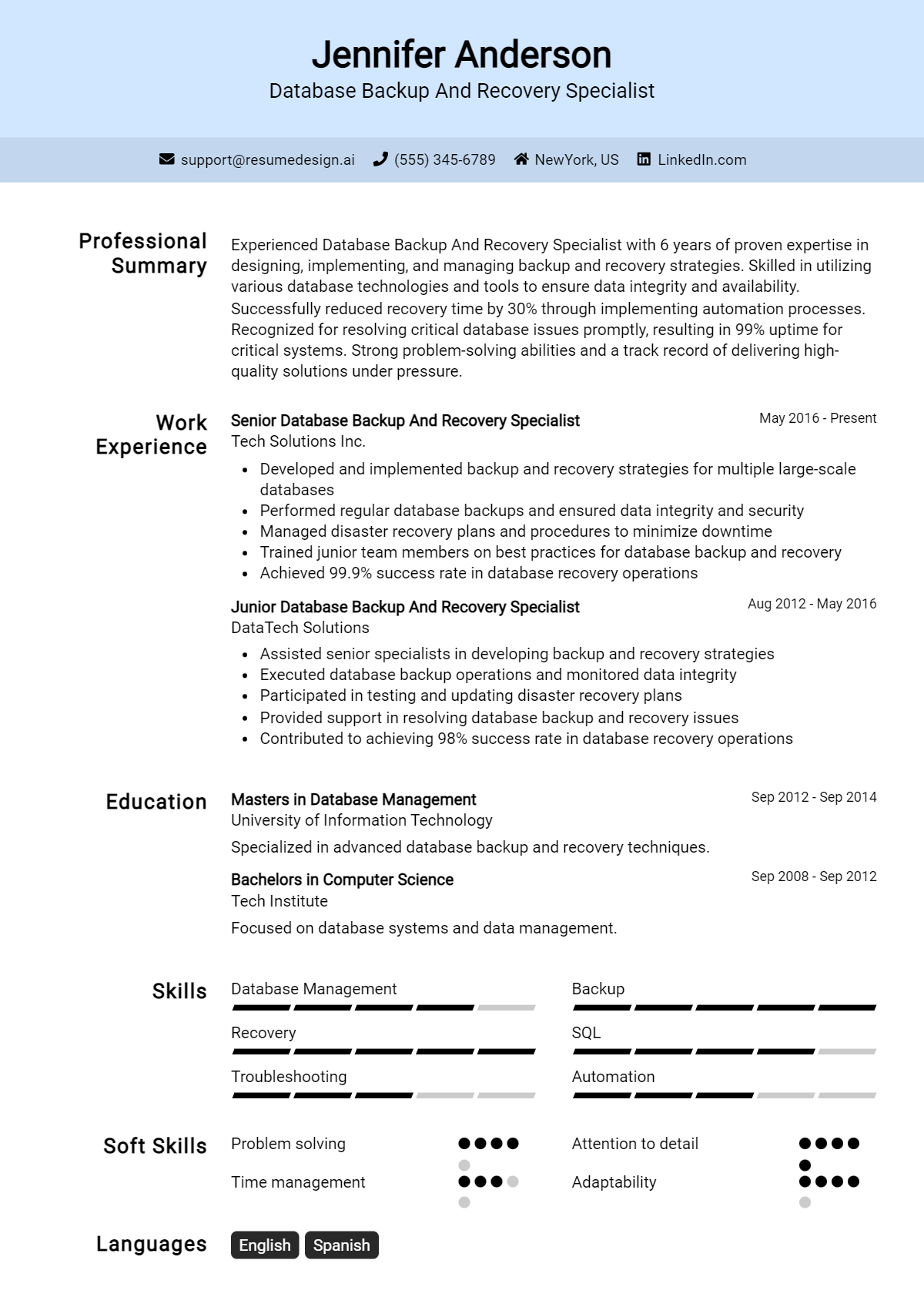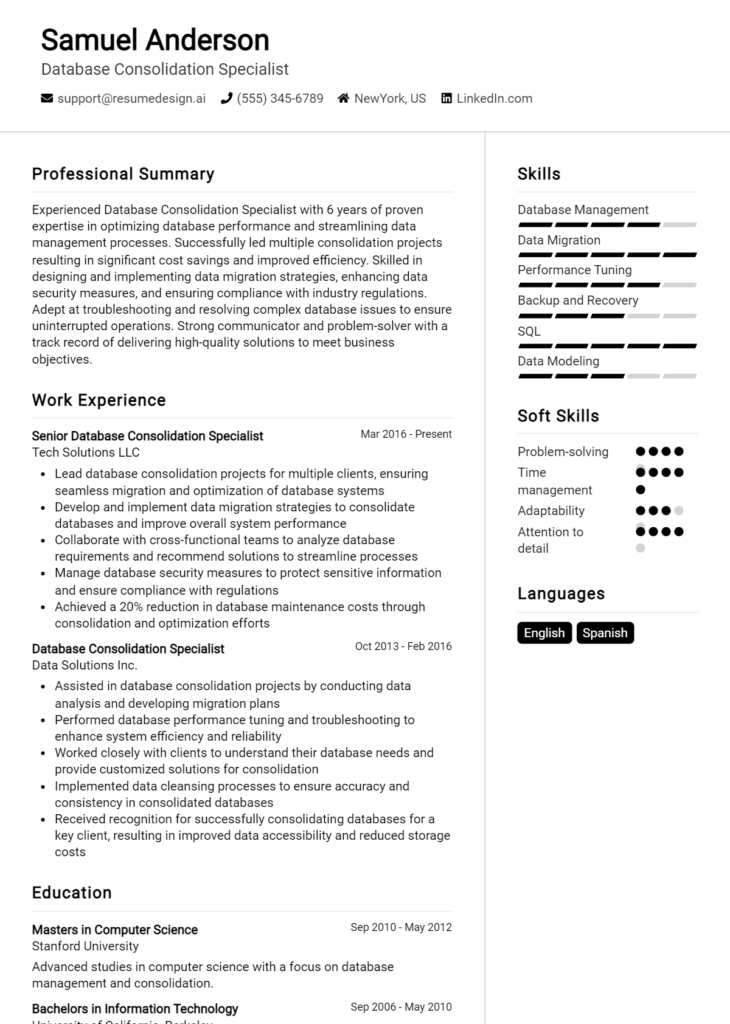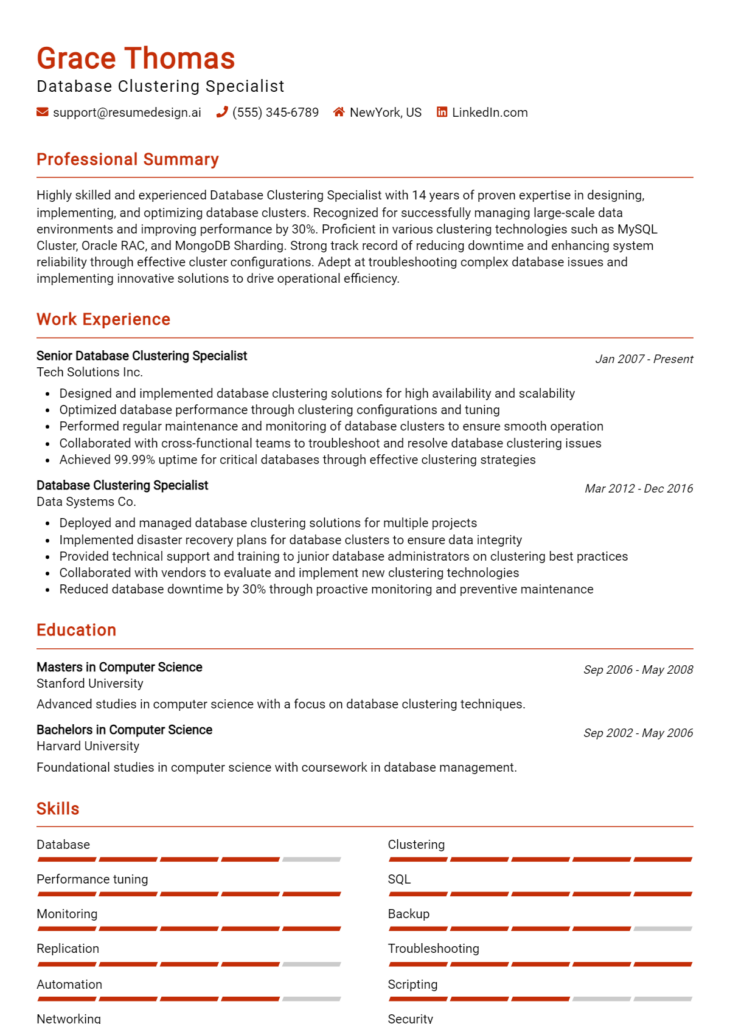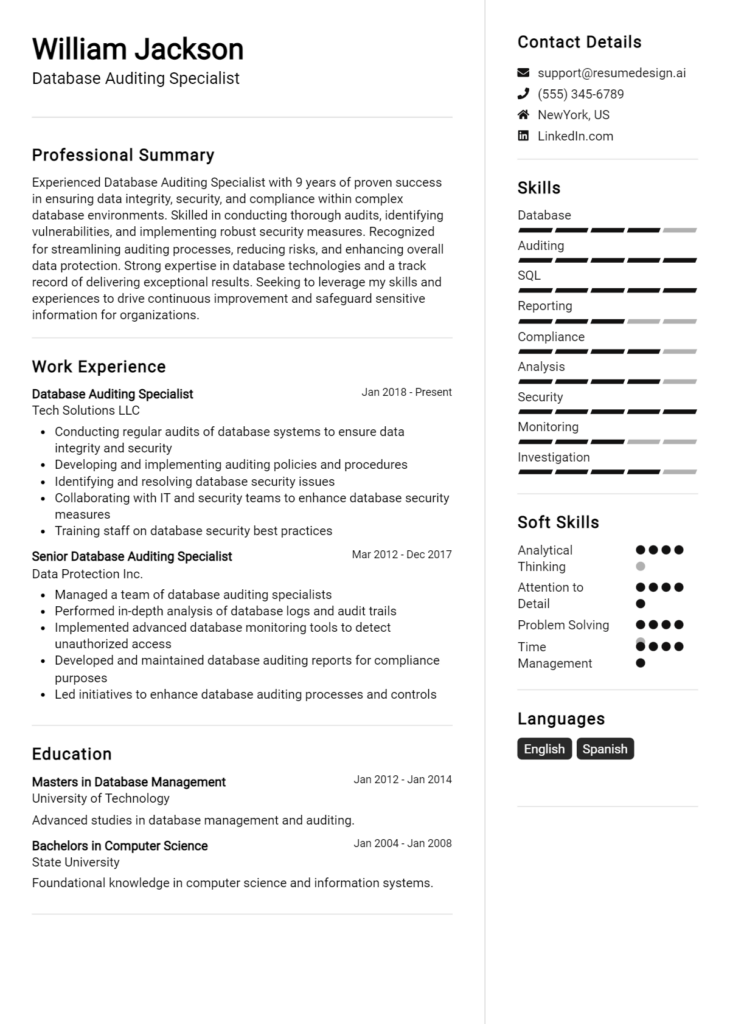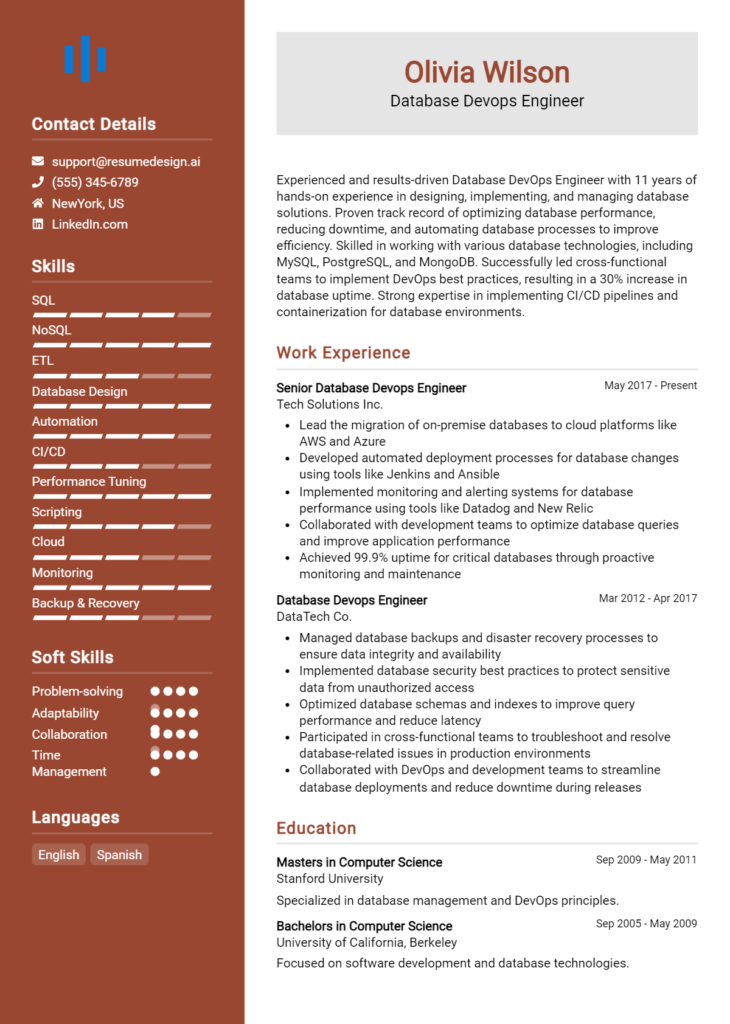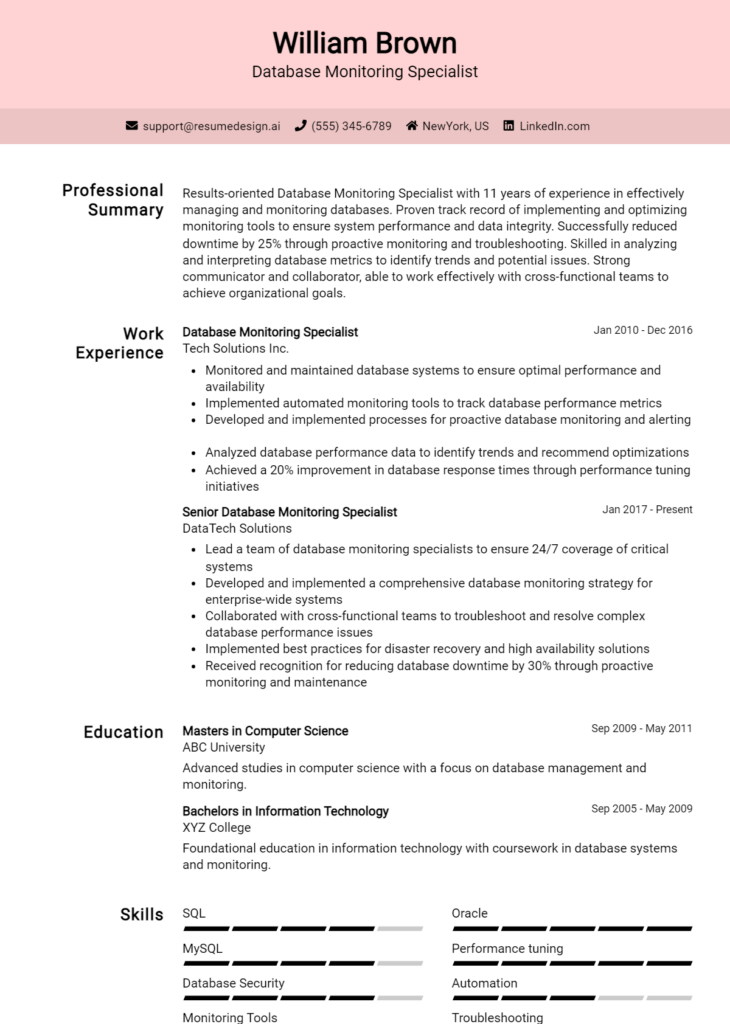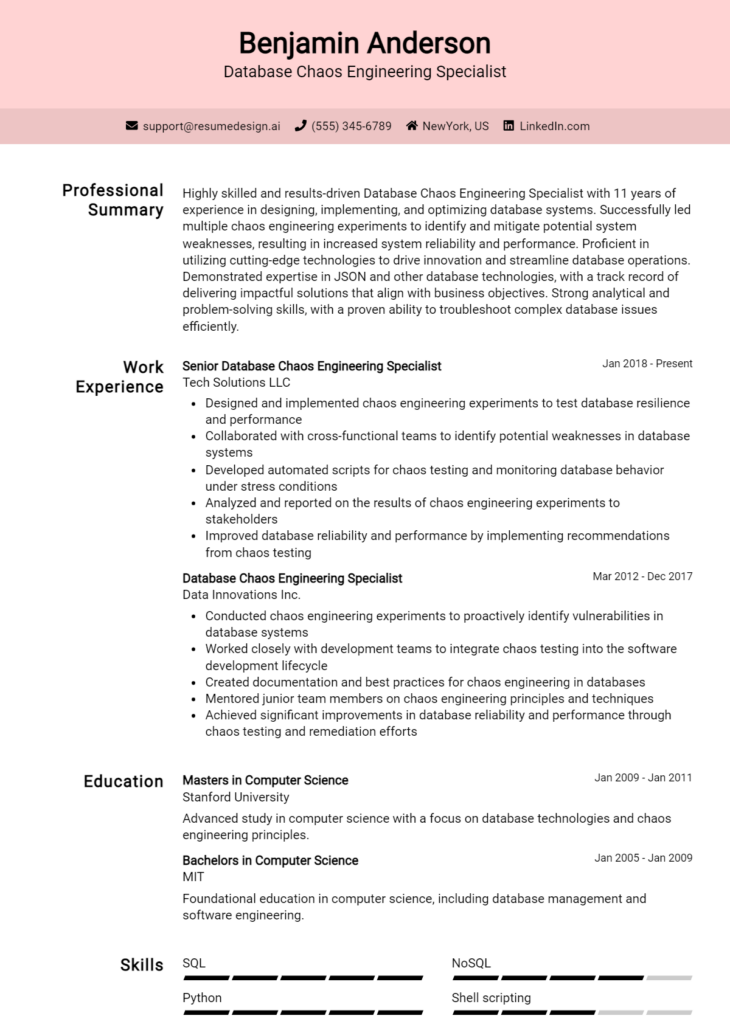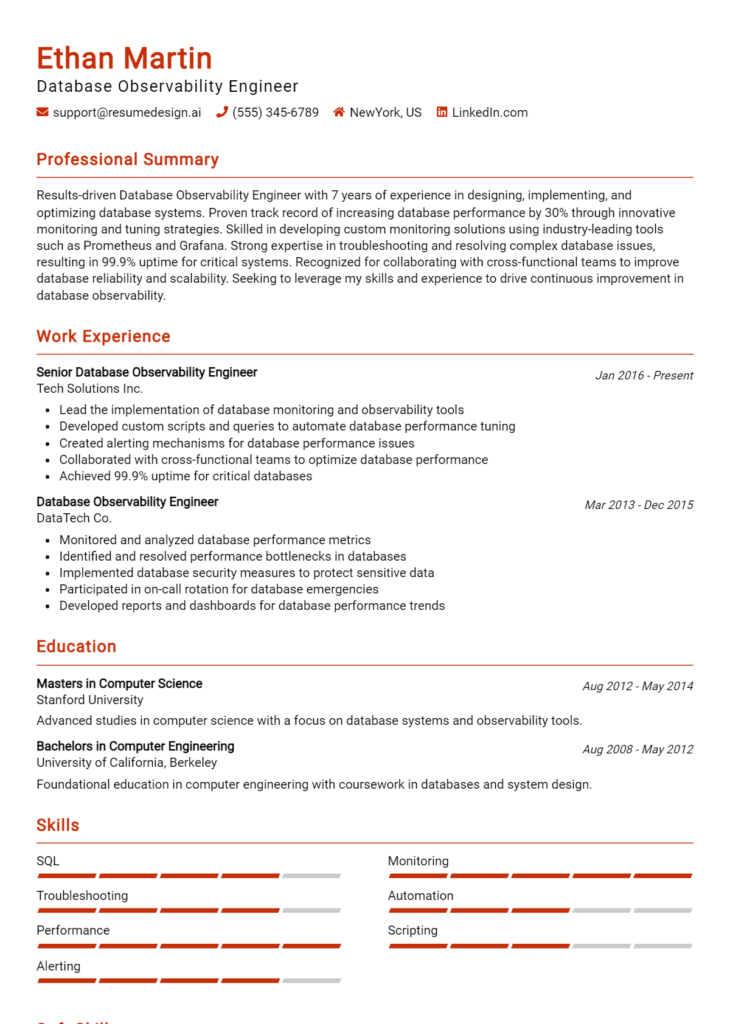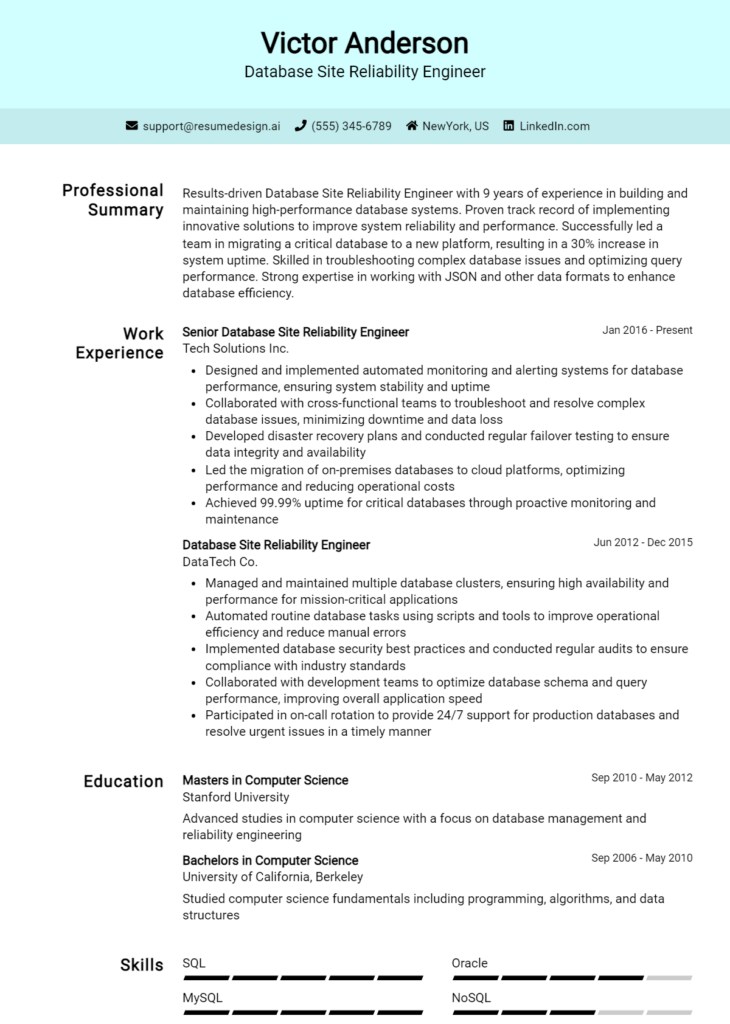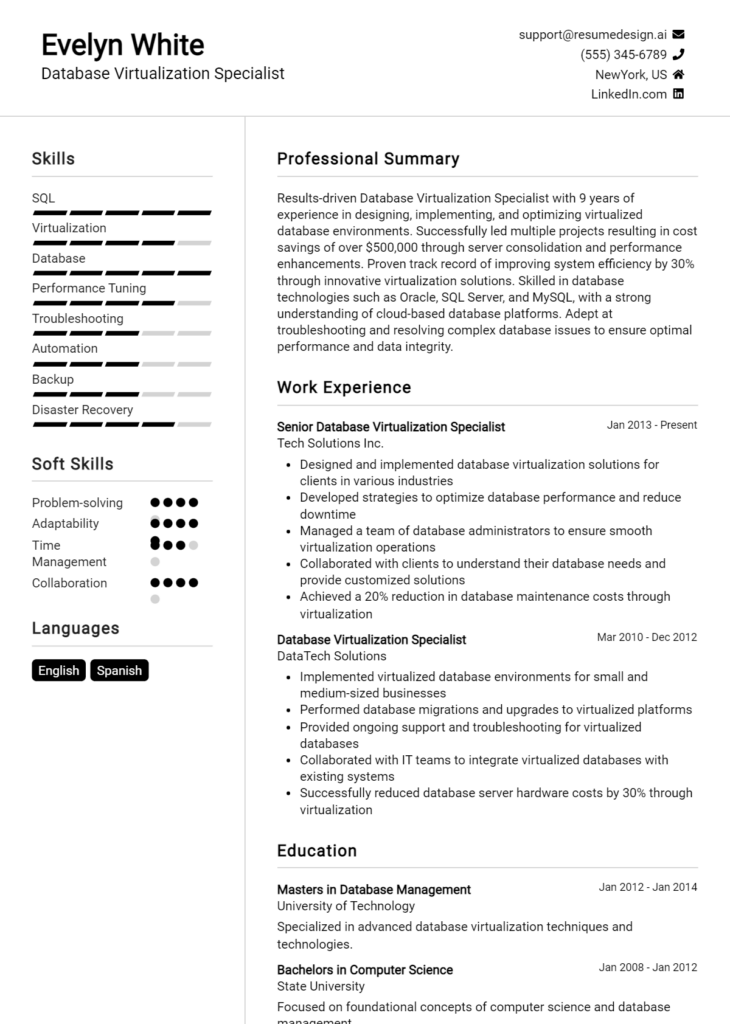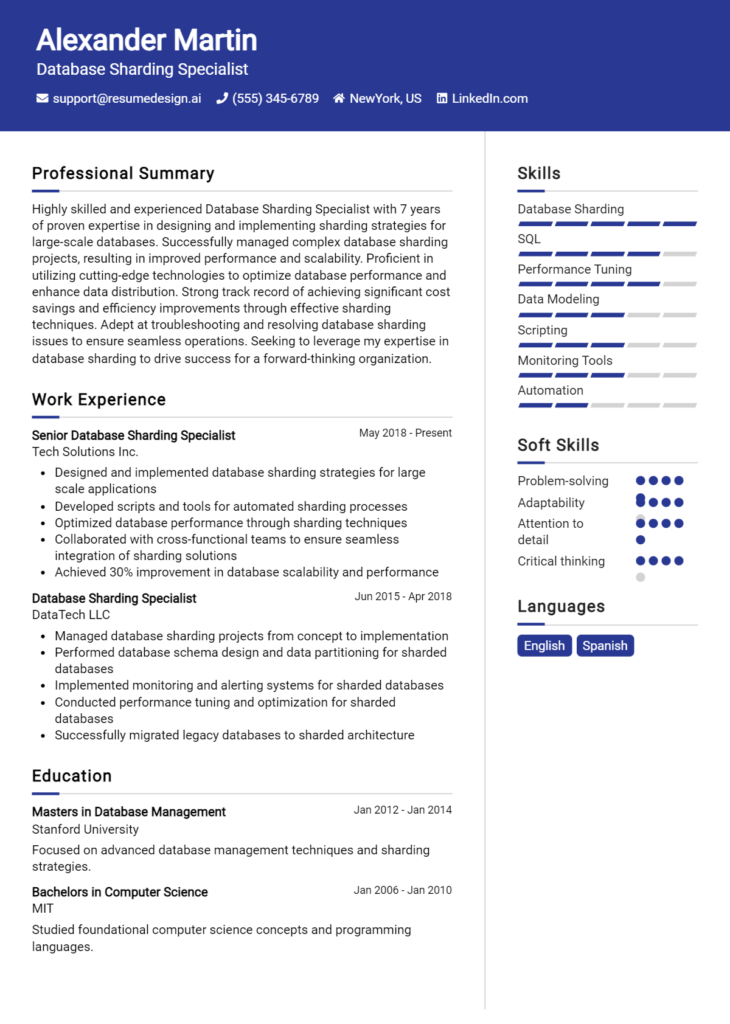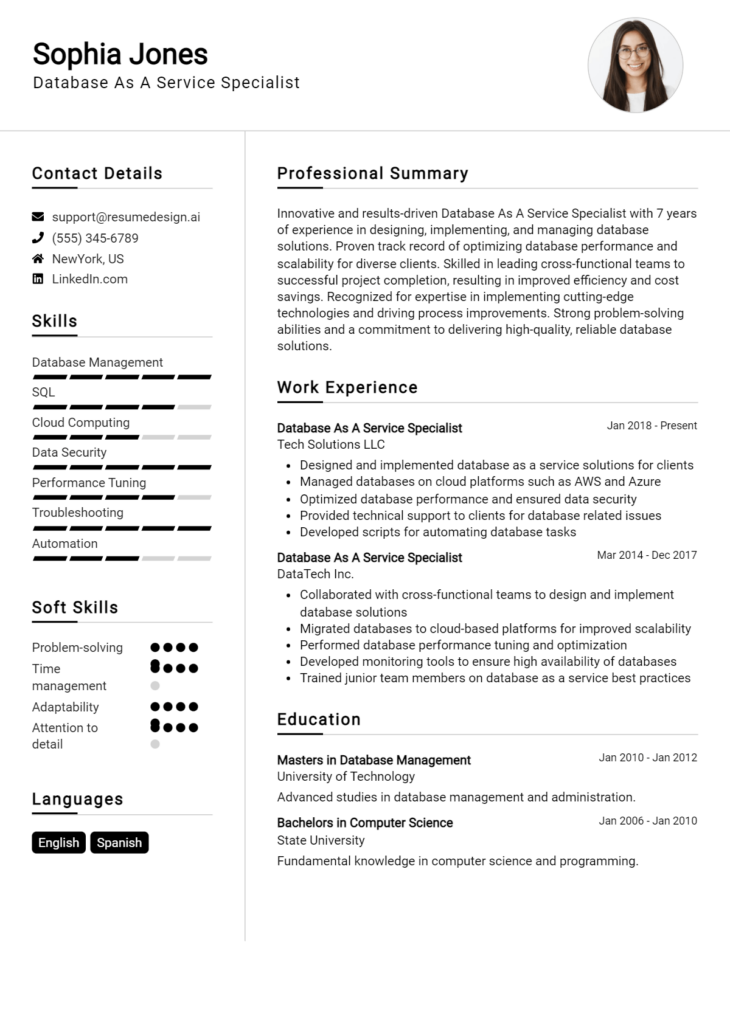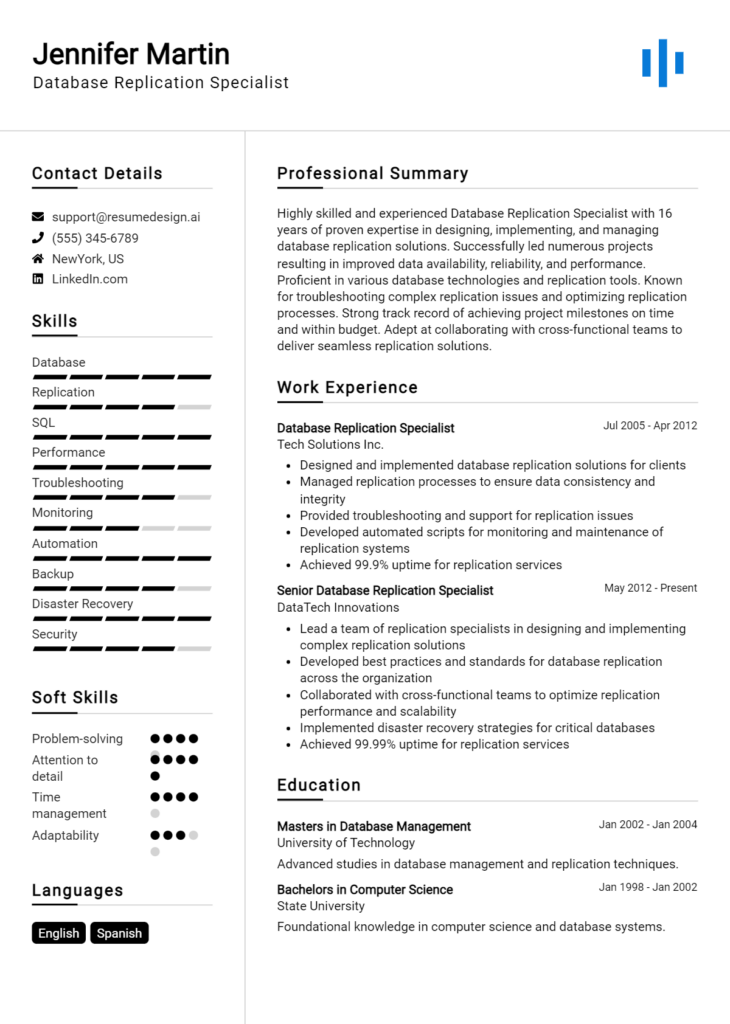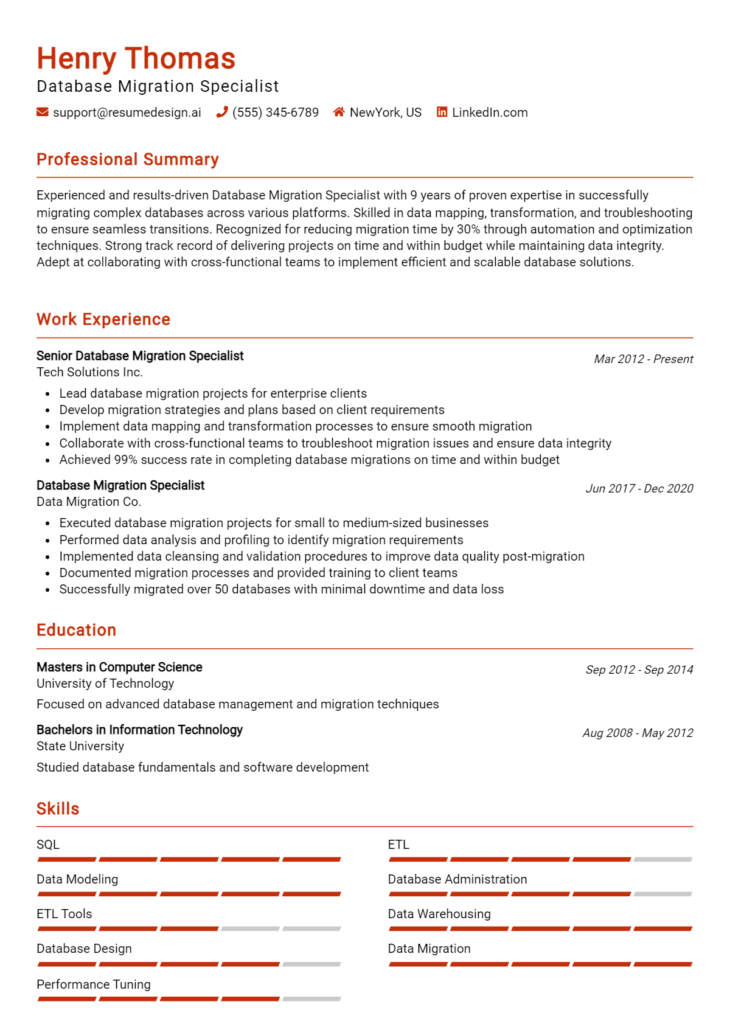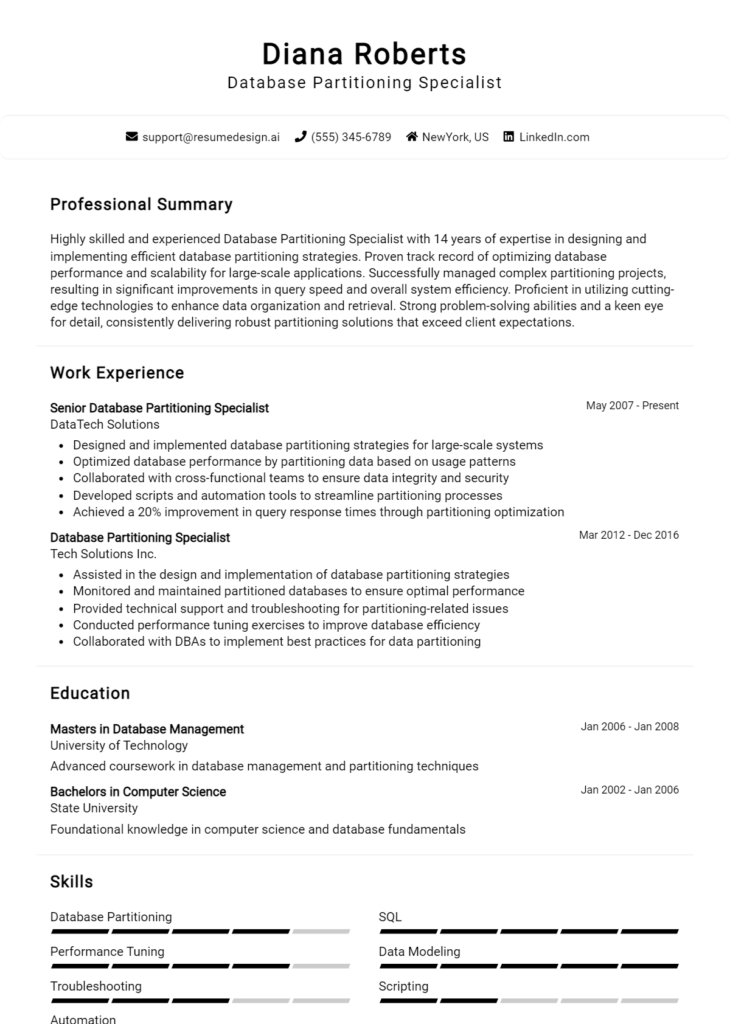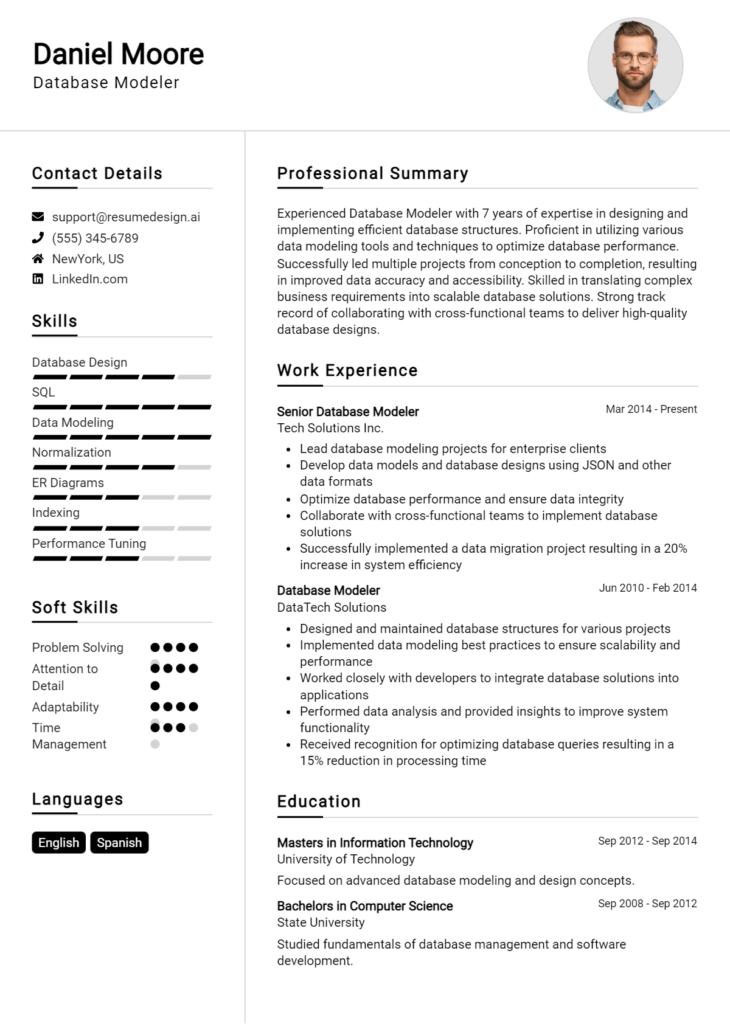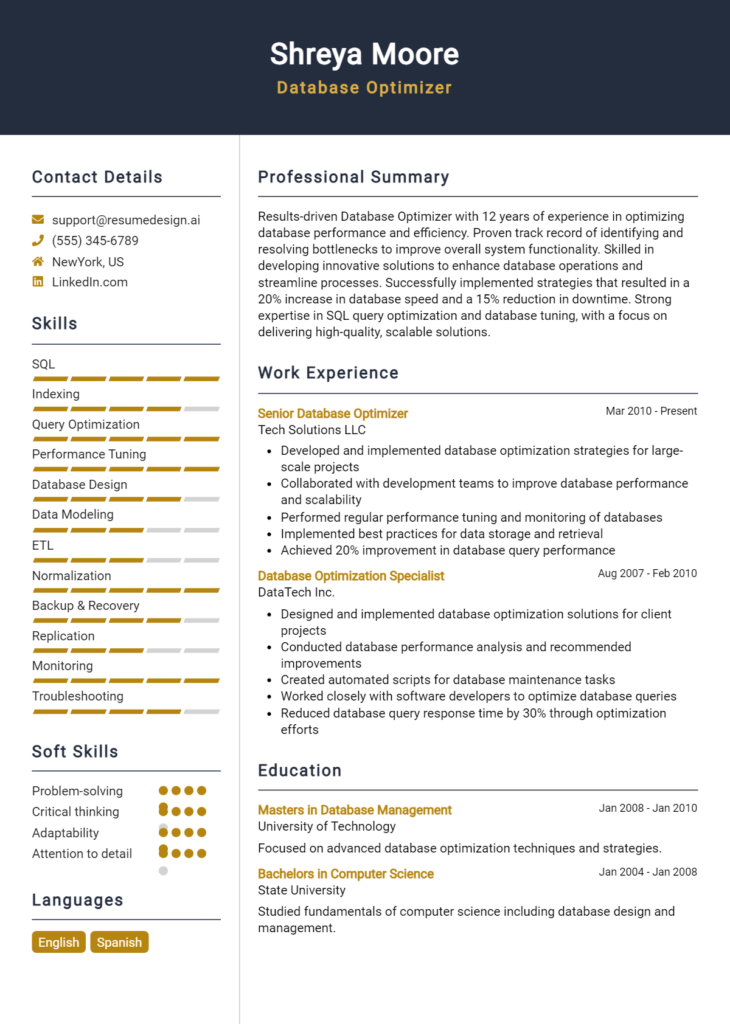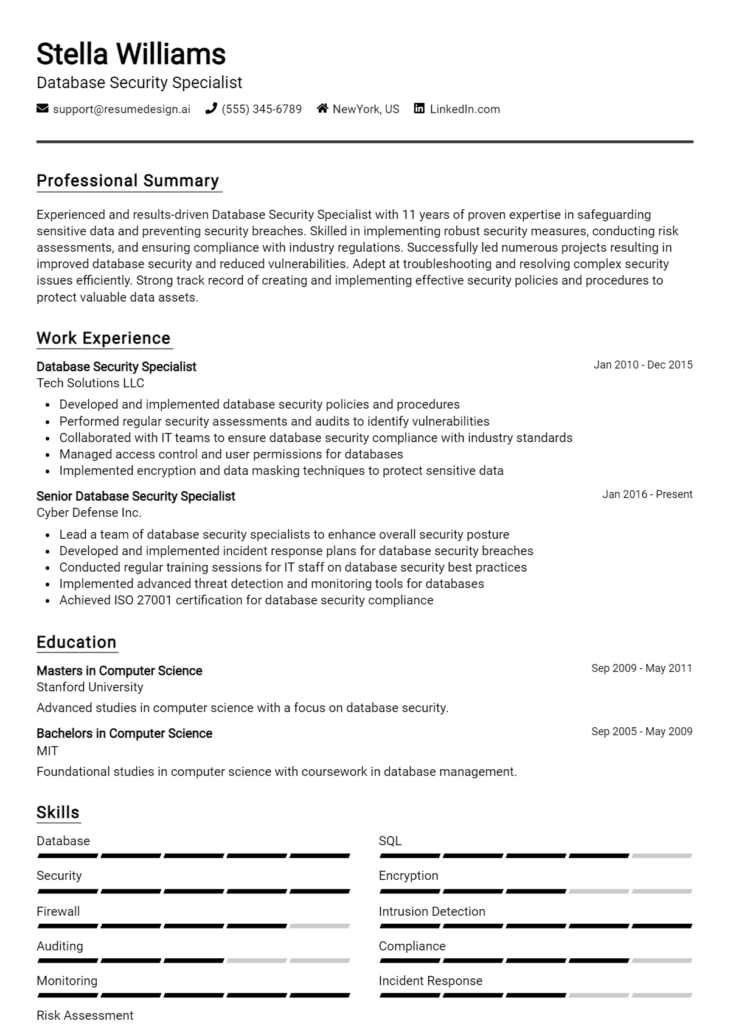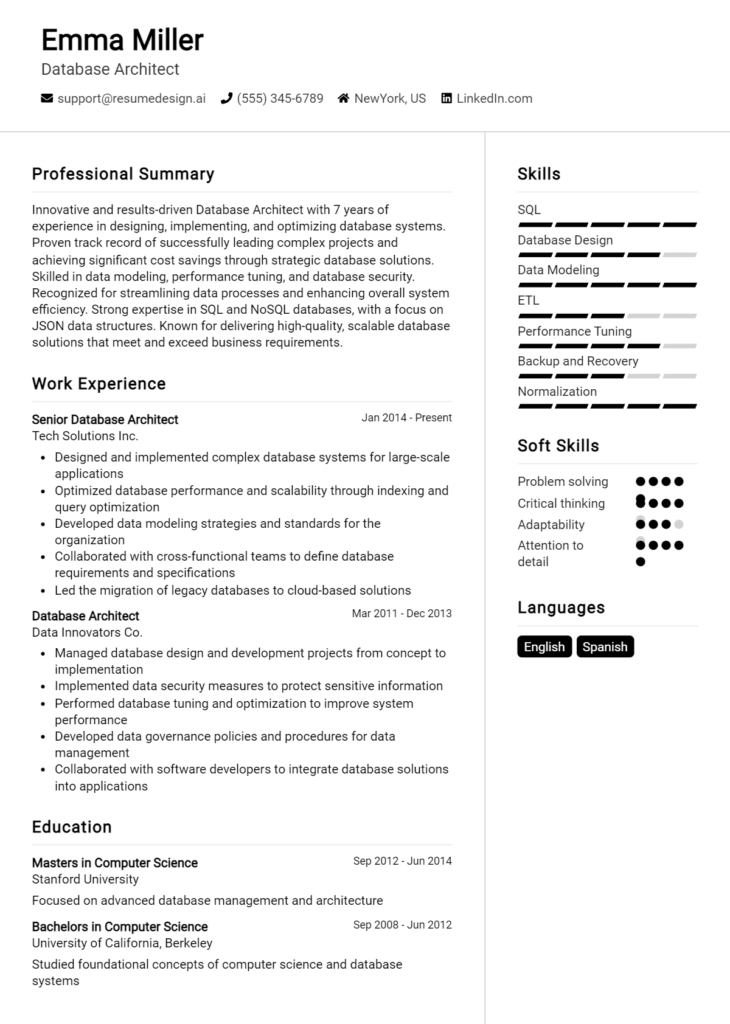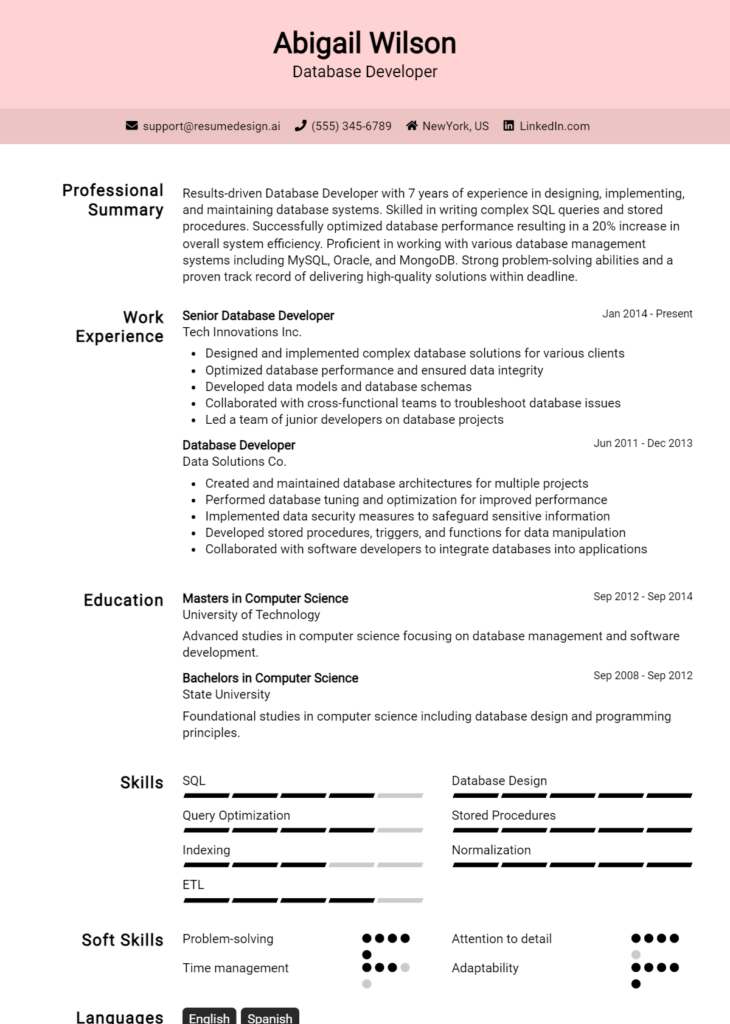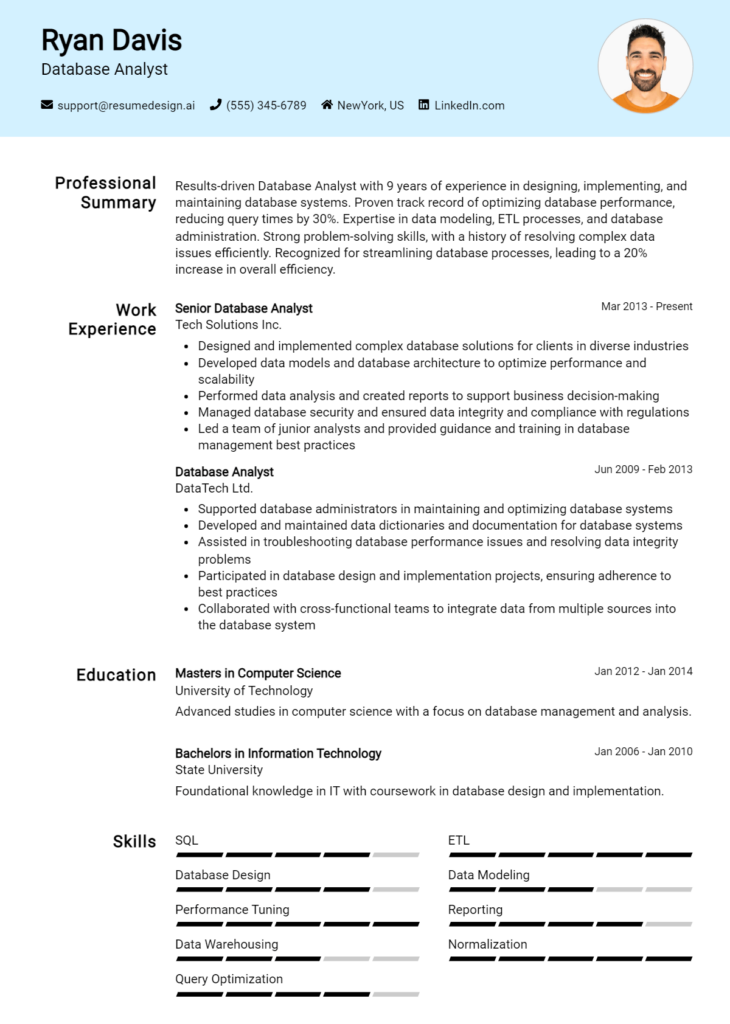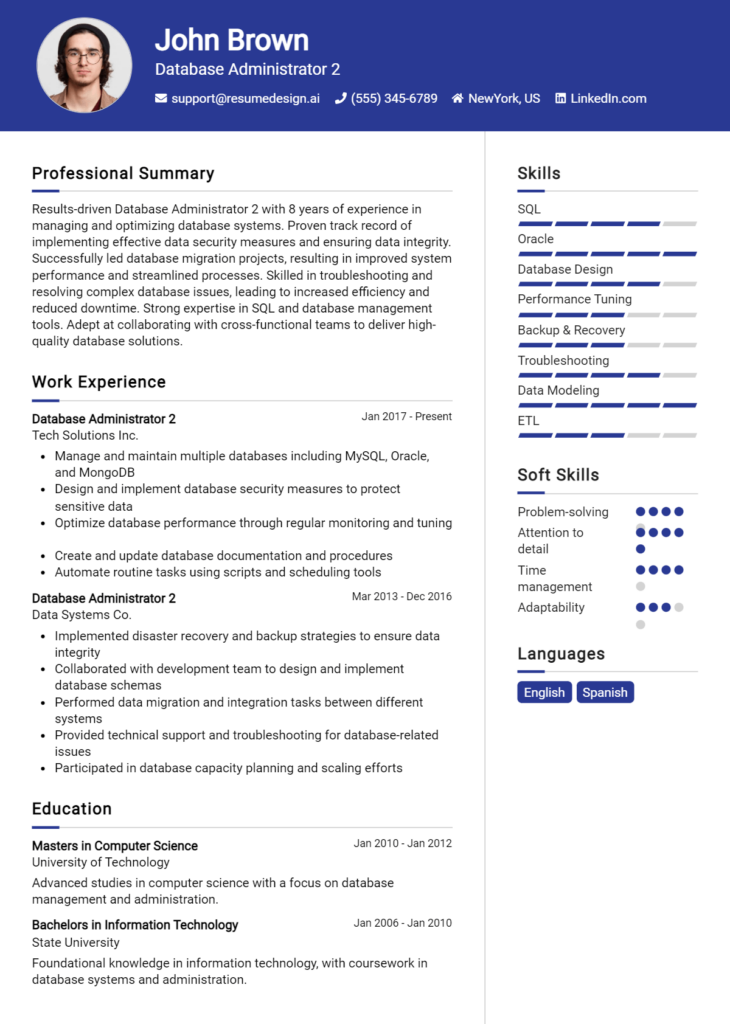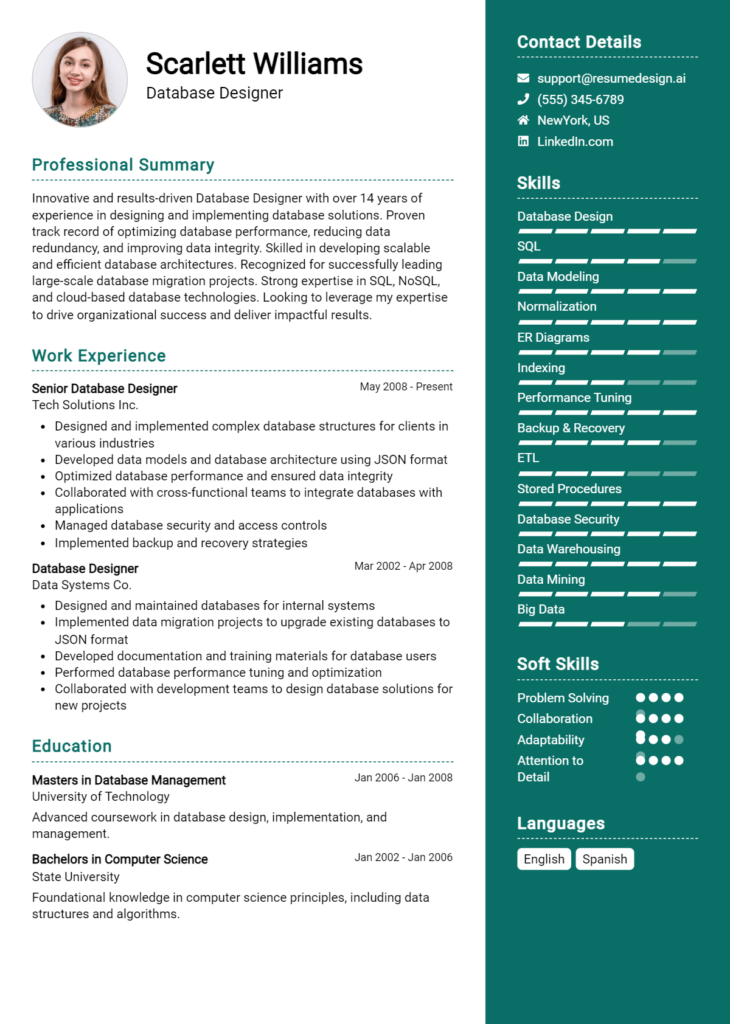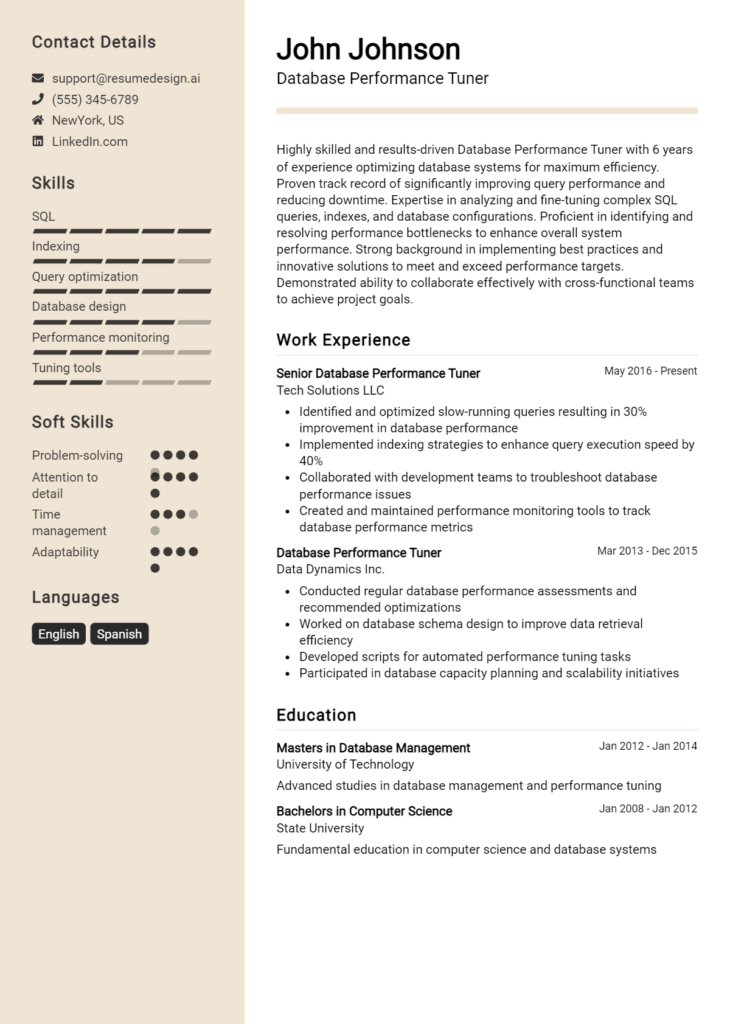Database Backup and Recovery Specialist Core Responsibilities
A Database Backup and Recovery Specialist is crucial in maintaining data integrity and availability across various departments. Their key responsibilities include designing and implementing backup strategies, conducting regular data recovery tests, and ensuring compliance with data protection regulations. Essential skills encompass technical expertise in database management systems, operational knowledge of disaster recovery processes, and strong problem-solving abilities. These competencies contribute significantly to the organization's resilience and efficiency. A well-structured resume can effectively highlight these qualifications, showcasing the specialist's value to potential employers.
Common Responsibilities Listed on Database Backup and Recovery Specialist Resume
- Develop and implement comprehensive backup and recovery plans.
- Monitor and optimize backup processes for performance and reliability.
- Conduct regular data integrity checks and recovery simulations.
- Collaborate with IT teams to ensure seamless data management.
- Document backup procedures and maintain accurate records.
- Troubleshoot and resolve backup-related issues promptly.
- Stay updated on industry best practices and emerging technologies.
- Train staff on data recovery processes and protocols.
- Ensure compliance with data protection laws and regulations.
- Assist in capacity planning and resource allocation for backups.
- Perform risk assessments to identify vulnerabilities in data storage.
High-Level Resume Tips for Database Backup and Recovery Specialist Professionals
In the competitive field of database management, a well-crafted resume serves as a crucial tool for Database Backup and Recovery Specialist professionals. This document often represents the first impression a candidate makes on a potential employer, making it imperative that it effectively highlights both technical skills and relevant achievements. A strong resume not only showcases a candidate's expertise in backup and recovery processes but also reflects their understanding of data protection strategies and industry best practices. In this guide, we will provide practical and actionable resume tips specifically tailored for Database Backup and Recovery Specialist professionals to help you stand out in the job market.
Top Resume Tips for Database Backup and Recovery Specialist Professionals
- Tailor your resume to each job description by using keywords from the posting to demonstrate alignment with the role.
- Highlight relevant experience by clearly outlining previous roles focused on database management, backup solutions, and recovery processes.
- Quantify your achievements with specific metrics, such as the percentage of downtime reduced or the number of successful data recoveries performed.
- Showcase industry-specific skills, such as knowledge of backup tools (e.g., Veeam, Veritas, or Acronis) and database platforms (e.g., SQL Server, Oracle, MySQL).
- Include certifications related to database management and recovery, such as Microsoft Certified: Azure Database Administrator Associate or Certified Information Systems Security Professional (CISSP).
- Use action verbs to convey your contributions effectively, such as "implemented," "developed," "executed," and "optimized."
- Incorporate a summary statement at the top of your resume that encapsulates your professional background and key skills in backup and recovery.
- Keep the format clean and professional, ensuring easy readability with consistent fonts and appropriate use of white space.
- Consider including a section for professional development, showcasing relevant training, workshops, or conferences attended to stay current in the field.
By implementing these tips, you can significantly increase your chances of landing a job in the Database Backup and Recovery Specialist field. A targeted and well-structured resume not only demonstrates your qualifications but also reflects your commitment to the craft, making you a more attractive candidate to potential employers.
Why Resume Headlines & Titles are Important for Database Backup and Recovery Specialist
In today's competitive job market, a well-crafted resume headline or title can serve as a powerful tool for Database Backup and Recovery Specialists seeking to make a strong first impression. These concise phrases not only grab the attention of hiring managers but also succinctly summarize a candidate's key qualifications and strengths in a single impactful statement. A compelling headline should be relevant to the specific role being applied for, showcasing expertise in database management, backup strategies, and recovery solutions. By effectively communicating one’s professional identity and value proposition, a strong headline can set the tone for the entire resume and encourage hiring managers to delve deeper into the applicant's qualifications.
Best Practices for Crafting Resume Headlines for Database Backup and Recovery Specialist
- Keep it concise – Aim for one to two lines that quickly convey your expertise.
- Make it role-specific – Use keywords related to database backup and recovery to align with job descriptions.
- Highlight key skills – Focus on your most relevant skills that directly address the job requirements.
- Include measurable achievements – If space permits, mention specific accomplishments or metrics that showcase your impact.
- Avoid jargon – Use clear and straightforward language that is understandable to a broad audience.
- Use active language – Choose strong action verbs that convey confidence and capability.
- Tailor to the job – Customize your headline for each application to reflect the specific requirements of the position.
- Engage with a strong hook – Use compelling phrases or questions that draw the reader’s attention.
Example Resume Headlines for Database Backup and Recovery Specialist
Strong Resume Headlines
"Certified Database Backup Specialist with 5+ Years of Experience in Disaster Recovery Solutions"
“Proven Track Record in Data Integrity and Recovery Management for High-Volume Databases”
“Expert in Automated Backup Solutions and Data Recovery Strategies for Enterprise Systems”
“Results-Driven Database Specialist Focused on Minimizing Downtime and Data Loss”
Weak Resume Headlines
“Database Specialist Looking for Opportunities”
“Experienced Professional in IT”
The strong headlines are effective because they are specific, highlight relevant skills, and include quantifiable achievements that demonstrate the candidate's value to potential employers. They immediately communicate the applicant's qualifications in a manner that resonates with hiring managers. In contrast, the weak headlines fail to impress due to their vagueness and lack of detail; they do not convey any unique strengths or qualifications, making it difficult for hiring managers to see the candidate’s potential contributions to their organization.
Writing an Exceptional Database Backup and Recovery Specialist Resume Summary
A well-crafted resume summary is essential for a Database Backup and Recovery Specialist as it serves as the first impression a hiring manager receives. This introductory section of the resume quickly captures attention by highlighting key skills, relevant experience, and notable accomplishments that align with the job requirements. A strong summary should be concise, impactful, and tailored specifically to the position the candidate is applying for, ensuring it resonates with the employer’s needs and stands out in a competitive job market.
Best Practices for Writing a Database Backup and Recovery Specialist Resume Summary
- Quantify Achievements: Use numbers and metrics to illustrate your impact, such as the amount of data backed up or the percentage of recovery time improved.
- Focus on Relevant Skills: Highlight technical skills pertinent to database backup and recovery, including proficiency with specific tools and technologies.
- Tailor the Summary: Customize your summary for each job application by incorporating keywords and phrases from the job description.
- Keep it Concise: Aim for 2-4 sentences that deliver the most important information efficiently without overwhelming the reader.
- Showcase Certifications: Mention any relevant certifications that enhance your qualifications as a specialist in database backup and recovery.
- Highlight Problem-Solving Skills: Emphasize your ability to troubleshoot and resolve issues that arise during backup or recovery processes.
- Incorporate Industry Experience: Reference your experience within specific industries if applicable, as this can enhance your credibility.
- Use Action-Oriented Language: Start sentences with strong action verbs to convey a sense of proactivity and competence.
Example Database Backup and Recovery Specialist Resume Summaries
Strong Resume Summaries
Detail-oriented Database Backup and Recovery Specialist with over 5 years of experience in designing and implementing robust backup strategies for large-scale enterprises. Successfully reduced data recovery time by 30% through the development of automated backup systems, ensuring maximum data integrity and availability.
Proficient Database Backup and Recovery Specialist with a proven track record of managing backups for over 10 terabytes of critical data. Achieved a 99% success rate in data recovery operations while minimizing downtime and enhancing system efficiency through innovative disaster recovery planning.
Results-driven Database Backup and Recovery Specialist with 7 years of experience in cloud-based backup solutions. Led a project that migrated on-premises databases to a cloud environment, reducing backup costs by 25% and improving recovery point objectives (RPO) by 50%.
Weak Resume Summaries
Experienced database specialist with knowledge of backup and recovery processes.
Database Backup and Recovery Specialist looking for new opportunities. Familiar with various database systems.
The strong resume summaries are considered effective because they provide specific details about the candidate’s achievements, quantify results, and demonstrate direct relevance to the role of a Database Backup and Recovery Specialist. In contrast, the weak summaries lack specificity, offer no measurable outcomes, and come across as generic, failing to make a compelling case for the candidate’s qualifications.
Work Experience Section for Database Backup and Recovery Specialist Resume
The work experience section of a Database Backup and Recovery Specialist resume is crucial as it serves as a testament to the candidate's technical expertise and practical application of skills in real-world scenarios. This section not only highlights the candidate's ability to manage teams and collaborate across departments but also showcases their proficiency in delivering high-quality backup and recovery solutions. By quantifying achievements and aligning experiences with industry standards, candidates can demonstrate their value to potential employers, making it essential to present this information compellingly and accurately.
Best Practices for Database Backup and Recovery Specialist Work Experience
- Highlight specific technologies and methodologies used in backup and recovery processes.
- Quantify achievements, such as percentage improvements in recovery time or cost savings.
- Use action verbs to describe contributions and responsibilities effectively.
- Include certifications or training relevant to database management and recovery.
- Demonstrate collaboration by mentioning cross-functional teams worked with on projects.
- Tailor experiences to align with the job description and industry standards.
- Provide examples of successful project implementations and their outcomes.
- Maintain clarity and conciseness to ensure easy readability and impact.
Example Work Experiences for Database Backup and Recovery Specialist
Strong Experiences
- Led a team of 5 in implementing a new backup solution that reduced recovery time by 40%, resulting in increased operational efficiency.
- Developed and executed a disaster recovery plan that improved data recovery success rates to 99.9% within the first year.
- Collaborated with IT security to integrate backup processes with enterprise security protocols, reducing data breach risks by 30%.
- Designed training programs for staff on backup best practices, leading to a 50% decrease in user error incidents.
Weak Experiences
- Worked on database backups and recovery tasks.
- Participated in projects related to data management.
- Assisted team members with various backup processes.
- Helped ensure data was backed up regularly.
The examples provided highlight the distinction between strong and weak experiences. Strong experiences are characterized by specific achievements, quantifiable results, and clear demonstrations of leadership and collaboration. They convey a sense of impact and responsibility that resonates with potential employers. In contrast, weak experiences tend to be vague and lack detail, failing to communicate the candidate's true capabilities or accomplishments in the field of database backup and recovery.
Education and Certifications Section for Database Backup and Recovery Specialist Resume
The education and certifications section of a Database Backup and Recovery Specialist resume is crucial as it showcases the candidate's academic background, relevant industry certifications, and commitment to ongoing professional development. This section not only highlights the technical knowledge acquired through formal education but also emphasizes the specialized training and certifications that are essential for success in the field. By including relevant coursework and recognized credentials, candidates can enhance their credibility and demonstrate their alignment with the job requirements, ultimately making a compelling case to potential employers.
Best Practices for Database Backup and Recovery Specialist Education and Certifications
- Include only relevant degrees and certifications that apply directly to database management and recovery.
- List certifications from recognized industry bodies, such as Microsoft, Oracle, or AWS, to demonstrate credibility.
- Detail any specialized training in backup technologies, disaster recovery planning, or data integrity.
- Highlight advanced degrees (e.g., Master’s in Computer Science) that provide a deeper understanding of complex database systems.
- Incorporate relevant coursework that aligns with backup and recovery techniques, such as database administration or information security.
- Update the section regularly to reflect new certifications and courses completed to showcase continuous learning.
- Use clear, concise language to describe qualifications, ensuring ease of readability for hiring managers.
- Prioritize certifications and educational experiences that are most relevant to the specific job description.
Example Education and Certifications for Database Backup and Recovery Specialist
Strong Examples
- Bachelor of Science in Information Technology, XYZ University, 2018
- Certified Database Administrator (CDBA) - Oracle, 2021
- Master Class in Database Backup and Recovery Techniques, ABC Training Institute, 2022
- AWS Certified Database – Specialty, 2023
Weak Examples
- Bachelor of Arts in English Literature, XYZ University, 2015
- Certification in Basic Computer Skills, Online Course, 2020
- High School Diploma, ABC High School, 2010
- Old certification in Windows Server Administration (expired), 2018
The strong examples are considered effective as they feature relevant degrees and credentials directly tied to database management and recovery, showcasing a solid foundation and specialized knowledge in the field. In contrast, the weak examples reflect qualifications that do not pertain to the role, lack industry recognition, or are outdated, which diminishes the candidate's appeal to potential employers.
Top Skills & Keywords for Database Backup and Recovery Specialist Resume
The role of a Database Backup and Recovery Specialist is critical in ensuring the integrity and availability of data within an organization. As data becomes an increasingly vital asset, possessing the right skills is fundamental to effectively safeguard it against loss or corruption. A well-crafted resume that highlights both technical and interpersonal skills can significantly enhance a candidate's chances of standing out in a competitive job market. By focusing on the top skills for this role, candidates can demonstrate their expertise in managing and recovering databases, while also showcasing their ability to collaborate and communicate effectively within a team.
Top Hard & Soft Skills for Database Backup and Recovery Specialist
Soft Skills
- Attention to Detail
- Problem-Solving Abilities
- Effective Communication
- Team Collaboration
- Critical Thinking
- Time Management
- Adaptability
- Analytical Skills
- Customer Service Orientation
- Project Management
Hard Skills
- Proficiency in SQL and Database Management Systems
- Experience with Backup and Recovery Tools (e.g., RMAN, SQL Server Backup)
- Knowledge of Data Recovery Techniques
- Understanding of Cloud Storage Solutions
- Familiarity with Disaster Recovery Planning
- Scripting Skills (e.g., Python, Bash)
- Database Performance Tuning
- Data Encryption and Security Best Practices
- Experience with Virtualization Technologies
- Knowledge of Regulatory Compliance Standards (e.g., GDPR, HIPAA)
For further insights on enhancing your resume, consider exploring more about skills and work experience relevant to your career aspirations.
Stand Out with a Winning Database Backup and Recovery Specialist Cover Letter
Dear [Hiring Manager's Name],
I am writing to express my interest in the Database Backup and Recovery Specialist position at [Company Name], as advertised on [Job Board/Company Website]. With over [X years] of hands-on experience in database management and a specialized focus on backup and recovery strategies, I am confident in my ability to contribute effectively to your team. My expertise encompasses a variety of database systems, including SQL Server, Oracle, and MySQL, allowing me to implement tailored solutions that safeguard data integrity and availability.
In my previous role at [Previous Company Name], I successfully developed and executed a comprehensive backup and recovery plan that reduced data loss incidents by [X%] and improved recovery time objectives (RTO) by [X hours/days]. My proactive approach includes regular assessments of backup processes, ensuring compliance with industry standards and company policies. I have also led training sessions for team members on best practices for database management, which not only enhanced our team's capabilities but also cultivated a culture of data stewardship within the organization.
I am particularly drawn to [Company Name] because of its commitment to innovation and excellence in data management. I am eager to bring my analytical skills and meticulous attention to detail to your organization, where I can contribute to enhancing your data protection strategies. I am excited about the opportunity to collaborate with your IT team to ensure that your database systems remain resilient and reliable in the face of challenges.
Thank you for considering my application. I look forward to the opportunity to discuss how my experience and skills align with the needs of [Company Name]. I am enthusiastic about the prospect of joining your team and contributing to the continued success of your data management initiatives.
Sincerely,
[Your Name]
[Your Phone Number]
[Your Email Address]
Common Mistakes to Avoid in a Database Backup and Recovery Specialist Resume
When crafting a resume for the role of a Database Backup and Recovery Specialist, it's crucial to showcase not only your technical skills but also your attention to detail and understanding of best practices in database management. However, many candidates make common mistakes that can undermine their qualifications and diminish their chances of landing an interview. Avoiding these pitfalls will help you present a strong, professional resume that highlights your expertise in backup and recovery processes.
Overusing Jargon: While industry-specific terminology is important, excessive jargon can make your resume difficult to read. Focus on clarity and ensure your skills are understandable to both technical and non-technical audiences.
Neglecting Specific Achievements: Simply listing job responsibilities without quantifiable achievements can make your experience seem vague. Instead, highlight specific accomplishments, such as successful disaster recovery drills or percentage increases in data recovery speed.
Failing to Tailor the Resume: A generic resume may not capture the attention of hiring managers. Customize your resume for each job application by aligning your skills and experiences with the specific requirements of the position.
Omitting Relevant Certifications: Certifications such as Microsoft Certified: Azure Database Administrator Associate or AWS Certified Database Specialty can set you apart. Ensure these credentials are prominently displayed on your resume.
Ignoring Soft Skills: Technical expertise is vital, but soft skills like problem-solving, teamwork, and communication are equally important. Incorporate examples that demonstrate your ability to work well with others and handle challenging situations.
Using an Unprofessional Format: A cluttered or overly complex layout can distract from your content. Stick to a clean, professional format with clear headings and bullet points to enhance readability.
Inaccurate or Outdated Information: Ensure that all information, especially dates and job titles, is current and accurate. Inconsistencies can raise red flags for potential employers and suggest a lack of attention to detail.
Neglecting Continuous Learning: The field of database management is ever-evolving. Highlight any ongoing education or training you’ve undertaken, such as workshops or online courses, to demonstrate your commitment to staying updated with the latest trends and technologies.
Conclusion
As a Database Backup and Recovery Specialist, your role is crucial in ensuring that an organization's data remains secure, accessible, and recoverable in the event of a failure or data loss. Throughout this article, we explored the key responsibilities, essential skills, and best practices that define this important position. You learned about the various backup strategies, the importance of regular testing of recovery plans, and the need for staying updated with the latest technologies and compliance regulations in data management.
The demand for skilled Database Backup and Recovery Specialists continues to grow, making it essential for professionals in this field to present their expertise effectively through a strong resume. Given the competitive nature of the job market, now is the perfect time to review and enhance your resume to stand out to potential employers.
We encourage you to take advantage of the available resources to optimize your resume and cover letter. You can access a variety of resume templates tailored to different job roles, use a resume builder for a user-friendly experience, or browse through resume examples to find inspiration. Additionally, consider utilizing cover letter templates to create a compelling introduction that complements your resume.
Don't miss the opportunity to enhance your job application materials today and increase your chances of landing that ideal Database Backup and Recovery Specialist position!

